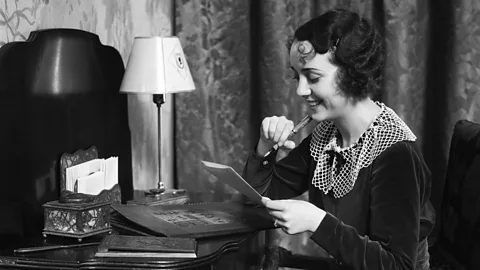The myths and reality of modern friendship
 Oli Scarff/Getty Images
Oli Scarff/Getty ImagesOver the past couple of years, digital connection has mattered more than ever, writes the philosopher Rebecca Roache. So, how is the nature of friendship changing?
During the Covid-19 lockdowns, I watched how my children responded to the fact that they couldn't see their friends in person. No face-to-face conversations. No playdates. No visiting friends. If the lockdown had happened a couple of decades earlier, any contact with people we didn't live with would have taken place via phone calls, email or letter-writing.
But in the 2020s, things are different. My daughter and her friends played a game on their phones while discussing their strategy in a WhatsApp group. My son, who is yet to reach the developmental milestone of smartphone ownership, chatted with his classmates via Google Classroom. Both kids grew noticeably shy during lockdown, but their nervousness about speaking to friends they hadn't seen for a while was cured by using video-calling platforms with built-in games: after a few minutes of wordless, giggling competition in which they became unicorns and caught donuts on their virtual nose-horns, they had loosened up to discuss serious matters like Pokémon and Mario Kart.
None of this technology existed a generation ago. When I was their age, non-face-to-face, real-time interactions with friends would take place over the phone in the downstairs hallway at home, where everyone could hear what I was saying and where I could talk for no longer than 10 minutes before an agitated parent started muttering about phone bills and "blocking the line". There were no donut-catching unicorns, although I was free to challenge my wits by attempting to untangle the spiral cable that linked the phone to the handset. Phone calls with friends were an occasional treat, not an everyday occurrence. Lockdown in my childhood would have been a very different social experience.
 Max Mumby/Getty Images
Max Mumby/Getty ImagesHow different, though? Are the differences in the ways we interact with our friends today versus a generation ago merely superficial, comparable to the difference between writing a letter to a friend on lined versus unlined paper? Or is there something about contemporary friendships that is fundamentally different to the friendships of yesteryear – and if so, how might friendship continue to change in the future?
You may also like:
It's common these days to complain that friendships aren't what they used to be. That restaurants are filled with people staring at their phones instead of talking. That selfie culture has turned us into narcissists who care more about managing our own PR than about being present with each other. That today's friendships are somehow more conditional than they were in the past, as we organise ourselves online into "echo chambers" of like-minded individuals and reject differing views. Even the word "friend" has been transformed by social media: there's a new sense in which being friends with someone just means having clicked "accept" on their friend request, without ever saying hello. There's a pervasive anxiety that true friendship is in decline, and that technology is to blame. Headlines like "The Era of Antisocial Social Media" and "Your Smartphone is Making You Stupid, Antisocial and Unhealthy" are familiar fare.
Pessimists might wonder where this is all going to end. Perhaps we'll find ourselves in a cynical world where we interact only with people who serve us, where we don't recognise our friends without their Snapchat filters, and where we don't form genuine connections with anyone. But are these concerns really justified?
Anxiety about the dystopian effects of new technology on friendship is as old as the written word. Older, in fact: for Socrates, the written word was itself part of the problem. Well over 2,000 years ago, Socrates supposedly expressed scepticism about letter-writing as a route to wisdom, favouring face-to-face interaction with peers. And at the beginning of 20th Century, concerns were raised that landline telephones would dilute interaction, or foster unhealthy social behaviours.
From our contemporary perspective, in which letters or telephones are about as benign as it's possible for technology to get, such concerns strike us as quaint. Of course they don't undermine friendship. On the contrary, they promote it: letters and phone between distant friends are exactly the sorts of wholesome institutions that hand-wringers about social media are afraid will die out.
 Getty Images
Getty ImagesSo, does social media threaten friendship, or promote it? In a 2012 paper, Shannon Vallor considers whether the sorts of friendships people have on Facebook can be real friendships, and she concludes that yes, they can. Her argument does not rest upon new-fangled ideas about friendship. Rather, she uses Aristotle's conception, which is over 2,000 years old. For Aristotle, friendship requires having certain virtues, including those of reciprocity, empathy, self-knowledge (in the sense of understanding our place in the world, including our place in our relations with others), and participating in a shared life.
Could scepticism about social media's impact on friendship be biased? It is, after all, often expressed by people whose early friendships were not formed around social media, which may make them more likely to ignore the positives.
People like us
Even if interacting through a screen is not destroying friendships, many people fear that the way in which we use digital technology to choose and nurture our friends encourages low-quality social connections. One such fear relates to echo chambers: those groups of like-minded individuals into which we sort ourselves, with the result that cross-fertilisation of ideas is reduced and people become more polarised and entrenched in their views. Some scholars claim that online echo chambers have serious implications for liberal democracy. But from a friendship point of view, they are nothing new. Long before the internet, people's social interactions were largely confined to like-minded others. Communities would spring up around places of religious worship, the marketplace, sports teams, workplaces and educational establishments, and along class, gender, and ethnic lines.
It's simply not true, then, that in the days before digitally-mediated friendship, people drew their friends from all walks of life. Perhaps we are all missing out as a result. But even if we are, the fact that the internet enables us to connect with similar people has some great benefits for friendship. It enables us to tap into support and solidarity that might not otherwise be available, either because people with the right sort of shared experiences would be difficult to find offline, or because the shared experiences in question are so intimate that we're reluctant to discuss them – a reluctance that is eased by interacting online. I rely heavily on this sort of community myself: for several years I've belonged to a private Facebook group of single mothers working in academia. The friendships I've made – which are spread across the world – along with the support I've given and received, have been hugely positive additions to my life.
 Joe Raedle/Getty Images
Joe Raedle/Getty ImagesIt seems plausible that the view that echo chambers are bad for friendship is based partly in a view that friendship is – or ought to be – deeper than shared interests and experiences. We have long been moved by stories of friendships and romances between people from diverse, often conflicting, groups. Perhaps the most iconic romantic couple, Romeo and Juliet, belonged to feuding families. The friendship between Nelson Mandela, while imprisoned for conspiring to overthrow South Africa's apartheid government, and a young, initially pro-apartheid, white prison guard captured the public's attention and was the focus of a film, Goodbye Bafana. In 2014, Arab-American journalist Sulome Anderson tweeted a photo of herself kissing her Jewish boyfriend, Jeremy, while holding a sign reading "Jews and Arabs REFUSE to be ENEMIES". The photo went viral.
These examples illustrate that we are captivated by the idea of looking beyond our friends' (perhaps unpalatable) views and interests, and loving the person behind them. It's certainly true that the best friendships don't stand or fall with shared interests. If you initially connected with your oldest friend over your shared love of 90s American boy bands but parted ways when one of you lost interest in Boyz II Men, it would be hard not to conclude that your friendship didn't run very deep. But this doesn't entail that there is anything wrong with seeking out connections based on shared interests. A deep, loving, supportive friendship of many years is not made any less deep, loving, and supportive because the friends in question initially connected through their boy band obsession.
Friendships, friendships, everywhere …
What about the idea that we now live in a world in which friendship is debased? In which social media encourage us to value quantity over quality, and to project images of glossy perfection at the expense of forming deep, intimate connections?
The concern that quantity of friendships comes at the expense of quality is – like the other concerns we've discussed so far – not at all new. In an essay entitled "On Having Many Friends", the 1st-century Greek philosopher Plutarch wrote:
"What then is the coin of friendship? It is goodwill and graciousness combined with virtue, than which nature has nothing more rare. It follows, then, that a strong mutual friendship with many persons is impossible, but, just as rivers whose waters are divided among branches and channels flow weak and thin, so affection, naturally strong in a soul, if portioned out among many persons become utterly enfeebled."
A couple of millennia later, Abba sang, "Facing 20,000 of your friends / How can anyone be so lonely?" in their 1980 single, "Super Trouper". And in 2009, Eoghan Quigg – a former contestant on the British talent show The X Factor – released a single, "28,000 Friends", with the lines, "You and your 28,000 friends / YouTube, Facebook, Myspace, IM" and "How does it feel to be alone? / So many friends that you don't know".
 Getty Images
Getty ImagesAccording to our digital timescales, Quigg's reference to Myspace is its own brand of ancient – but we might wonder whether the technology that has emerged over the past couple of decades encourages us to spread our friendships more thinly than ever. Does Quigg have more reason to gripe about this than Plutarch did? The answer is that, while empirical evidence supports the claim that we are incapable of having a great many close friendships, it’s far from clear that social media's capacity to multiply our social connections is reducing the quality of our friendships.
The anthropologist Robin Dunbar studied social groups over the centuries and found that the number of stable social connections that individuals can maintain has remained fairly constant, at roughly 150. This figure – which has come to be known as Dunbar’s Number – denotes, more or less, "the number of people you would not feel embarrassed about joining uninvited for a drink if you happened to bump into them in a bar". There are subdivisions within this. We each tend to have three to five people who constitute "the small nucleus of really good friends to whom you go in times of trouble", and a "sympathy group" of 12-15 people "whose death tomorrow would leave you distraught" – but, Dunbar argues, we simply lack the cognitive capacity to inflate these groups. "[I]f a new person comes into your life," Dunbar explains, "someone has to drop down into the next level to make room for them". Since the number of friends we can have is limited by our cognitive capacity, not even the ease of making online connections can enable us to expand it. Commenting on social media, Dunbar remarks that "there is an issue about what really counts as a friend". Those who have very large numbers – that's to say, larger than about 200 – invariably know little or nothing about the individuals on their list," he adds.
The fact that Dunbar's Number is – as Dunbar sees it – limited by our cognitive capacities points to a possible way in which friendship might look different in the future. Cognitive capacities – including attention, memory, perception, and decision-making – relate to the mental processing of information. We use various strategies and tools to help us improve these capacities. We drink coffee to help us focus, wear glasses to improve our vision, write lists to help us remember things, and so on. The improvements we make as a result are relatively modest, and often short-lived. However, many believe that, in the near future, we will be able to make far more drastic improvements to our cognitive capacities using technologies like drugs, transcranial electrical stimulation, brain implants, and genetic engineering. The results could see human cognitive capacities far exceed anything we've seen before.
In that case, perhaps we might be able to maintain close friendships with significantly more people. But given that even cognitively enhanced versions of ourselves would be constrained by the number of hours we have for socialising, increasing our number of close friends would need to involve wringing more intimacy from the time we spend with each friend. Or, it could be that a cognitively enhanced world would come with other changes, such as a reduction in working hours, which could free up more time for friends.
On the other hand, even with the cognitive capacity to have more close friendships, perhaps many would value having fewer friends. Romantic relationships provide an analogy: having the capacity to maintain multiple partners apparently does not result in most people wanting to live non-monogamously. So, a cognitively enhanced future of friendship might end up looking different to the way friendship looks now – but equally, it might not.
 Drew Angere/Getty Images
Drew Angere/Getty ImagesIt might seem that, by encouraging us to use the term "friend" to refer to hundreds or even thousands of people with whom we have only very superficial connections, social media is (to use Plutarch’'s metaphor) devaluing the coin of friendship. Facebook friends are, after all, often friends in name only – especially for those users whose friends run into the hundreds or thousands. But using "friend" to refer to people one does not know particularly well is nothing new. In her study of social connections in 18th-Century England, Naomi Tadmor explains that a few centuries ago, a person would count as friends not only those with whom they had relatively intimate emotional relationships, but also family, household staff, employers, and so on. She points to the term "Society of Friends" – still used to today as a term for Quakers – as an example of this wider use of the term.
Despite changes over the years in whether certain people with whom we have relatively loose social connections count as friends, there has remained a stable core. The handful of people who constitute Dunbar’s "small nucleus" and the dozen or so who make up the "sympathy group" have always counted as friends. But changes in our views about what we owe our friends hint at what might become of these smaller, intimate groups. Consider our views about loyalty. It's good to be loyal to our friends – but in professional contexts, we use terms like "cronyism" and "nepotism" to condemn loyalty to friends. Tadmor explains that things were different in the past. In the 18th Century, serving one's friends was viewed as a virtue, even in politics. Just as giving one's friends a shoo-in for a job in politics was virtuous three centuries ago but objectionable today, perhaps some practices that today count as virtuous will one day be viewed as objectionable. Today, nobody raises an eyebrow at a lawyer who gives out free advice to friends (but not strangers) or a hairdresser who styles his friends' hair (but not strangers' hair) for free. Providing strangers, free of charge, with the sort of help that they would otherwise have to pay for is kind, but not expected or required. Things might change in the future. Perhaps giving friends the benefit of one's skills while denying it to strangers will be viewed as cronyism in the centuries to come.
What would a future world with different ideas about what we owe to our friends look like? Well, probably not that different to today's world. It's also not like contemporary friendship is the same thing all over the globe. Friendships in individualist cultures – typical of English-speaking countries and much of Western Europe – differs in several important ways from friendships in Arab, East Asian, African, and Latin American countries where there is a more collectivist culture. For example, reciprocity between friends is typically valued more in individualist than in collectivist cultures. Individualists don't like to be indebted to friends by not returning favours; collectivists don't view such interactions in terms of favours and instead view those who resist accepting help from friends as aloof and egotistical. Behaviour between friends that, in individualist cultures, is seen as inappropriately interfering – like correcting a friend's class notes – is deemed considerate and caring in collectivist cultures. Those in collectivist cultures tend to be confident that their close friendships will endure without nurturing by saying positive things; as a result, they speak to their friends with a frankness that would be viewed as cold in individualist cultures. As the psychologist Roger Baumgarte – from whose survey of cross-cultural friendship research I've drawn these observations – remarks, these cultural differences reveal that even what it means to be a close friend varies by culture.
The future of friendship
What should be our lesson from all this? The mediums and technologies that enable friendship may change, but much stays the same. The phonecalls and handwritten letters of a few decades ago might seem more wholesome than today's WhatsApp texts, but their function is similar. This can be jarring: when I see my children poring over their iPads, I have to remind myself that although they may look withdrawn and solitary, most of their screen time in fact centres around interacting with friends. Tempting as it is to lock away their electronics forever and send them outside with a skipping rope, doing that would likely result in their being excluded from an important community – and while spending every waking hour hunched over a smartphone is not a recipe for a fulfilling life, neither is spending every waking moment writing letters. The kids are all right.
* Rebecca Roache is a philosopher at Royal Holloway, University of London and host of The Academic Imperfectionist podcast. This article is adapted from an essay in Future Morality (ed. David Edmonds), published by Oxford University Press.
--
If you liked this story, sign up for the weekly bbc.com features newsletter, called "The Essential List" – a handpicked selection of stories from BBC Future, Culture, Worklife, Travel and Reel delivered to your inbox every Friday.
